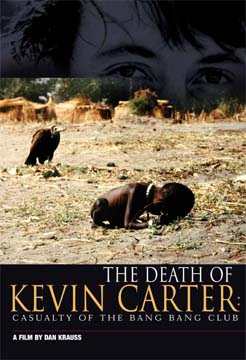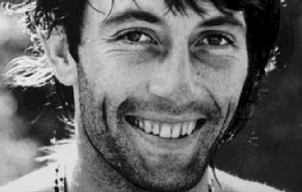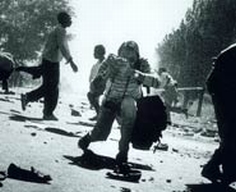A Note of Triumph: The Golden Age of Norman Corwin God Sleeps in Rwanda The Mushroom Club
Casualty of the Bang Bang Club
Director: Dan Krauss
South Africa/USA, 2005, 27 minutes, in English
SYNOPSIS
Dan Krauss' "The Death of Kevin Carter: Casualty of the Bang Bang Club" focuses on the tragic death of the South African photojournalist who covered war, apartheid, starvation and other harrowing events in several African nations in the 1990s.

Later, traveling to the Sudan to record the civil conflict (a war that is still going on), he came back with a photo of an emaciated child crawling along the ground while a vulture lurks in the background. The image was so heart-wrenching and horrifying that it immediately became the symbol of the Sudanese conflict. This iconic photo, which ran in the New York Times, earned Carter a 1994 Pulitzer Prize.
This documentary film is an attempt to understand the suicide of the South African photographer just weeks after he won the 1994 Pulitzer Prize. Carter was a handsome, charismatic but often tormented white man who so identified with the travails of South Africa's black population that he numbed his anger and pain with drugs and alcohol. But through it all, Carter was committed to using his camera as a tool for change.
Haunted by visions of the killings and corpses in South Africa, and the full horror of starvation in the Sudan, Carter found himself tormented by doubts about the ethical implications of his work. And, as the film conveys, Carter had difficulty with his sense of guilt: guilt over getting paid for photos while people in Africa were starving; and guilt over the death of his close friend, photojournalist Ken Oosterbroek.
The film acknowledges Carter's individual shortcomings, but as a photojournalist himself Krauss' cinematic explorations go further, leading the viewer to the realization that it has taken journalism far longer than other first-responder professions to recognize the job-related risks that come with covering trauma and extreme human distress.
Because they're meant to be objective, dispassionate and distanced in the reporting they do, the myth prevails that journalists are also armored against the emotional impact of war, violence and tragedy. Not so. Reporters and photographers are vulnerable human beings like anyone else, and can be hurt by the things they see and report. They can become depressed and anxious. They can drink too much and abuse drugs. Their relationships and personal lives are often disastrous.
Journalists are neither invulnerable nor invincible. And the horrendous, despair-laden events they document can exact a terrible price.


ABOUT THE FILMMAKER [Back to Top]
Dan Krauss is based in the San Francisco Bay area and is a graduate UC Berkley's Graduate School of Journalism. This is Krauss' first film and was actually his thesis project. Originally submitted in the student film category, THE DEATH OF KEVIN CARTER is the only student film from the Berkeley School of Journalism to be nominated for a regular 'best film' category by the Academy that awards the Oscars.

"I first heard about Kevin Carter when I began working as a news photographer some 10 years ago. His story was offered as a cautionary tale - a lesson about the risks of witnessing human suffering.
"It is true that Kevin was wounded from seeing too much bloodshed. But speaking with those who knew him, I learned that it was not only the violence that haunted Kevin - it was his own mortality.
"In his famous picture of the vulture stalking the Sudanese girl, I began to see the embodiment of his troubled psyche. I believe Kevin did too. In the starving child, he saw Africa's suffering; in the preying vulture, he saw his own face.
"But there is another way to look at the picture, which Megan Carter, Kevin's daughter, explained to me: 'I see my dad as the suffering child,' she said. 'And the rest of the world is the vulture.'
"And so these are the legacies of Kevin Carter: the thoughtful insights of his loved ones, their anecdotes of his astonishing humanity, and Kevin's own images of his anguished country. My purpose is to sustain Kevin's legacy, to shed light upon it, and to depict Kevin with the same degree of candor and conscientiousness with which he lived his life."

AWARDS & FESTIVAL SCREENINGS [Back to Top]
Academy Award (Oscar) Nominee for Best Documentary Short 2005;
Winner, Golden Gate Award, San Francisco International Film Festival, San Francisco;
Winner, Best Short Documentary, Tribeca Film Festival New York;
Winner, Best Documentary, L.A. International Short Film Festival, Los Angeles;
Winner, Best Short Documentary, Cleveland Int'l Film Festival;
Winner, Audience Choice Award, Orinda Film Festival, Orinda, CA;
Honorable Mention, Directors Guild of America, Los Angeles;
Honorable Mention, Best Short Documentary, Oakland Int'l Film Festival, Oakland;
Writers Guild of America Theater IDA DocuDay, Los Angeles;
Museum of Modern Art Academy screening, New York;
Directors Guild of America Theater IDA DocuDay New York;
True/False film festival, Columbia, MO;
Pacific Palisades Film Festival, Pacific Palisades, CA;
Hot Springs Documentary Film Festival, Hot Springs, Arkansas;
Montreal FilmFest, Montreal, Quebec;
One Reel/Bumbershoot Film Festival, Seattle;
Full Frame Documentary Film Festival, Durham, North Carolina;
DocuFest, Wilmington, North Carolina;
Ashland Independent Film Festival, Ashland, OR;
Encounters Documentary Film Festival, Johannesburg, South Africa.